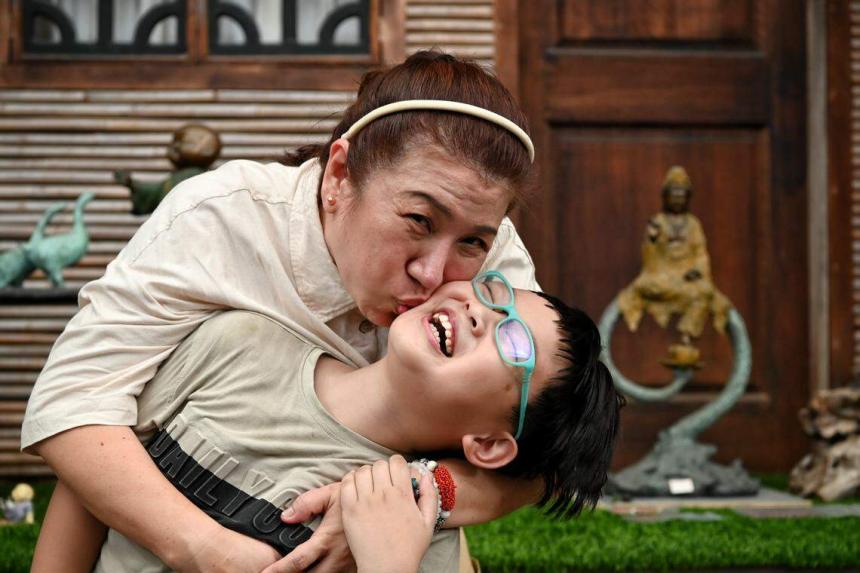SINGAPORE - A 55-year-old woman gave birth to a baby in 2022, making her Singapore’s oldest mother to a newborn last year.
In fact, she is only the third woman aged 55 and older to have given birth and registered the birth of a baby since the Immigration and Checkpoints Authority (ICA) started publishing the annual report on registration of births and deaths in 1989, checks by The Straits Times found.
The 2022 report was released on June 30.
In the report, just one mother out of some 35,000 women who gave birth in 2022 was aged 55 and older. She is a university graduate who gave birth to her second child.
An ICA spokesman told ST that the woman is 55 years old, and she gave birth to a boy.
ST had reported that in 2016, a 58-year-old woman gave birth to twins. She is believed to be Singapore’s oldest mother to date, or the second oldest.
This is because the exact age of a woman who gave birth in 2019 is unknown, except that she belonged to the 55-and-older age group.
The trend comes as a very rare, but growing number of women aged 50 and older are giving birth – stretching the limits and norms of motherhood.
In the 21 years from 1989 to 2009, six women aged 50 and older gave birth to seven babies. One woman had twins.
Fast forward to between 2010 and 2019, and five times more women – 33 of them in this age group – gave birth to 41 babies.
And in the three years from 2020 to 2022, nine women in this age group gave birth to nine babies, checks by ST found.
The most famous of these late-in-life mothers would probably be veteran actress and getai singer Liu Ling Ling, who gave birth at the age of 50 in 2013. She had said in interviews that her son was conceived through in-vitro fertilisation (IVF).

Dr Liu Shuling, director of the KKIVF Centre at the KK Women’s and Children’s Hospital, said the number and quality of a woman’s eggs decline as she ages.
She added that most women would have reached menopause by the time they turn 50, and conceiving a child naturally after reaching menopause is impossible.
It is “very rare” for women over 50 years of age to conceive naturally, she said.
Dr Suresh Nair, medical director of Monash IVF Singapore, has four patients in their 50s who gave birth. The oldest among them was 52.
He said that these women all used donors’ eggs to conceive through IVF. What this means is that the babies are not biologically related to the women, but to the egg donors and the husbands of Dr Nair’s patients.
The husband’s sperm was fertilised with the egg from the donor in an IVF clinic, and the resultant embryo implanted in Dr Nair’s patient’s womb.
He said these patients had their IVF procedure performed overseas, in countries like Malaysia and the United States. It was only in 2020 that the age limit of 45 for IVF treatment in Singapore was lifted.
Dr Nair said of the mothers in their 50s: “Their need to have a child is so powerful that they would go through all the hurdles and risks to have a child.”
Some of them have been trying for a baby for years, while others have remarried and are hoping to have children with the new husband, he said.
The awareness that it is still possible for women – with the help of assisted reproductive technology – to become mothers in their mid-40s to 50s is the reason why there is a growing number of such late-in-life mothers, doctors say.
News of celebrities, such as singer Janet Jackson and supermodel Naomi Campbell, having children in their 50s has rekindled hope of motherhood for some older women.
Dr Nair stressed that pregnancy at such an age is fraught with very significant risks, and he puts older women through a thorough host of medical checks to ensure they are fit for pregnancy.
Associate Professor Su Lin Lin, head of the division of maternal foetal medicine at National University Hospital, said older women have a higher risk of miscarrying in their first trimester. There is also a higher risk of their babies having chromosomal abnormalities, among other risks.
These women are also more likely to develop pregnancy-induced hypertension, pre-eclampsia and gestational diabetes, she added.
Dr Liu said the risk of dying from pregnancy-related complications for a 45-year-old woman is 10 times higher than for a woman who is 35 years old or younger.
She added that a 45-year-old woman has a 90 per cent risk of miscarriage, and the risk increases with age.
The world’s oldest mother is a woman from India who gave birth to twins at the age of 73 in 2019. Madam Mangayamma Yaramati used donor eggs to conceive through IVF.
Her husband, who is at least five years older than her, died of a heart attack one year after their daughters were born.


